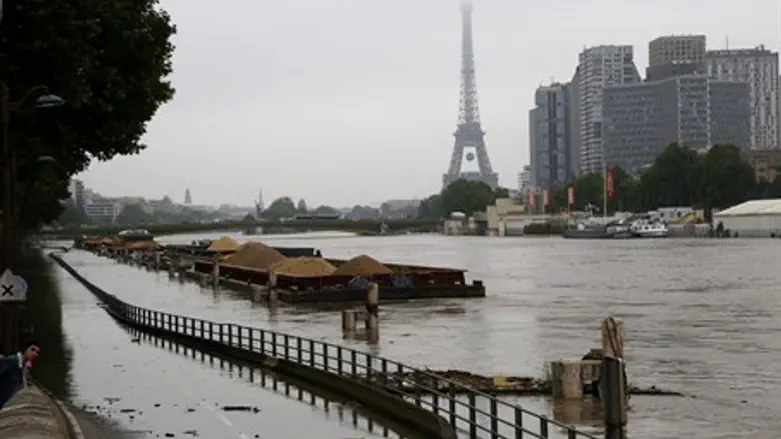
In an ironic twist of fate, the same Friday that the international conference of the French initiative to force peace talks on Israel was launched in Paris, floodwaters in the capital city reached peak levels in what has been declared as a natural disaster.
The River Seine in Paris is set to reach six meters (19 feet) above its normal levels on Friday, causing the prestigious Louvre and Orsay museums to close as staff anxiously rushes to move famous artworks out of the flood path.
Heavy rains over the last week have caused massive flooding in the region and inflicted a heavy toll, leaving ten dead in southern Germany and one dead in France. Thousands of residents have been forced out of their homes to escape the flooding.
The floodwaters are set to only rise further in Paris, as more heavy rain is predicted over the weekend with a possibility of upwards of 50 millimeters (2 inches) in just a few hours, reports BBC.
France's environment ministry revealed that the River Seine has not reached its current height since 1982, in an indication of the severity of the flood.
Over 5,000 people have been evacuated from towns in central France during the course of the week and 19,000 homes are without power, reports AFP.
French President Francois Hollande on Thursday declared a state of natural disaster for the worst hit areas of the flooding, so as to release emergency funds for local authorities.
The statement comes even as Hollande on Friday told Israel and the Palestinian Authority (PA) to make the "courageous choice" to advance peace, in remarks as the French initiative meeting began in Paris attended by foreign ministers from around the world - no Israeli or Palestinian representatives were present.
France's initiative is based on the 2002 Saudi peace initiative, which called on Israel to make massive concessions and withdraw behind the 1949 Armistice lines in return for paper promises not to attack from its Arab neighbors.
Israel rejected the Saudi deal and has rejected the French initiative, although Prime Minister Binyamin Netanyahu said this week he would be open to re-negotiating aspects of the Saudi initiative with the Palestinians.